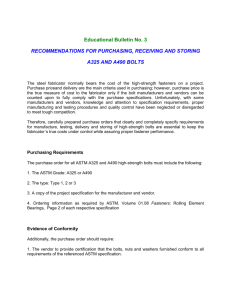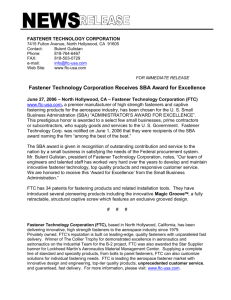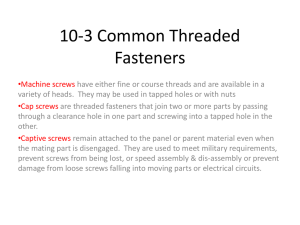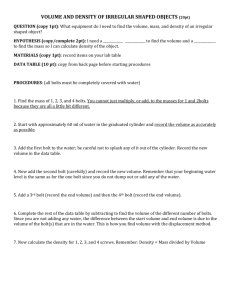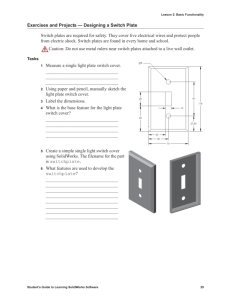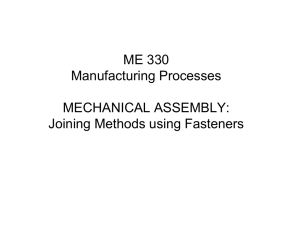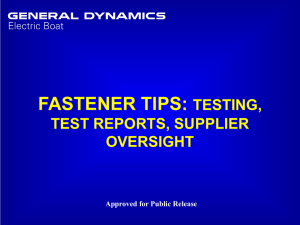Fastener Basics: Types, Materials, and Strength Guide
advertisement
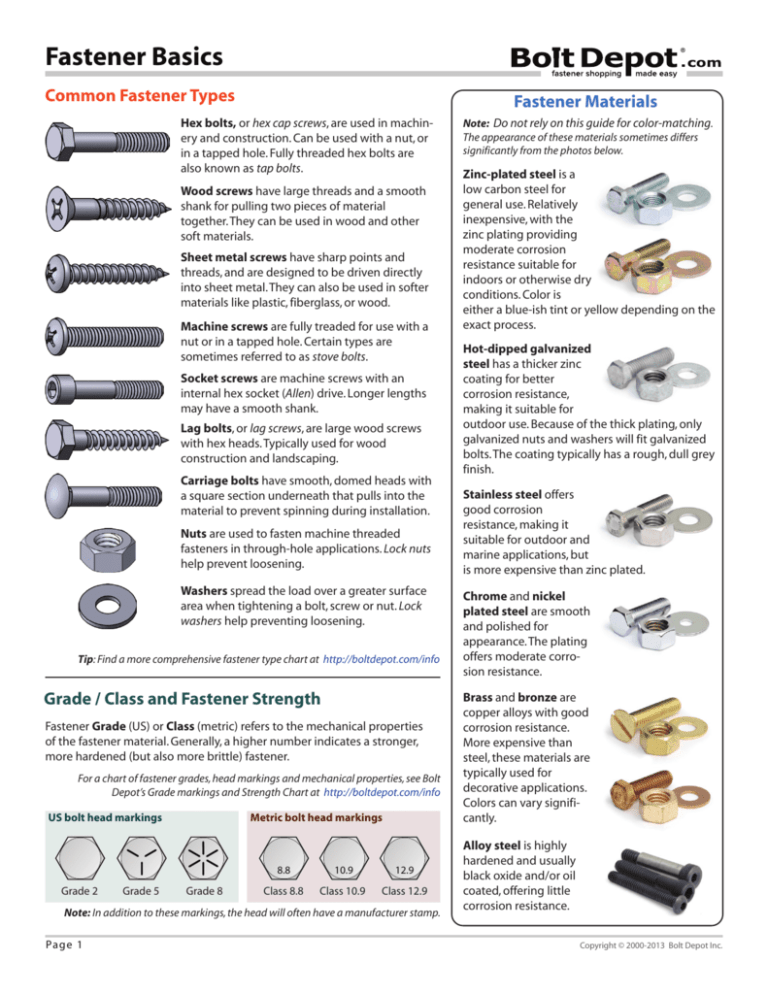
Fastener Basics Common Fastener Types Fastener Materials Hex bolts, or hex cap screws, are used in machinery and construction. Can be used with a nut, or in a tapped hole. Fully threaded hex bolts are also known as tap bolts. Wood screws have large threads and a smooth shank for pulling two pieces of material together. They can be used in wood and other soft materials. Sheet metal screws have sharp points and threads, and are designed to be driven directly into sheet metal. They can also be used in softer materials like plastic, fiberglass, or wood. Machine screws are fully treaded for use with a nut or in a tapped hole. Certain types are sometimes referred to as stove bolts. Socket screws are machine screws with an internal hex socket (Allen) drive. Longer lengths may have a smooth shank. Lag bolts, or lag screws, are large wood screws with hex heads. Typically used for wood construction and landscaping. Carriage bolts have smooth, domed heads with a square section underneath that pulls into the material to prevent spinning during installation. Nuts are used to fasten machine threaded fasteners in through-hole applications. Lock nuts help prevent loosening. Washers spread the load over a greater surface area when tightening a bolt, screw or nut. Lock washers help preventing loosening. Tip: Find a more comprehensive fastener type chart at http://boltdepot.com/info Grade / Class and Fastener Strength Fastener Grade (US) or Class (metric) refers to the mechanical properties of the fastener material. Generally, a higher number indicates a stronger, more hardened (but also more brittle) fastener. For a chart of fastener grades, head markings and mechanical properties, see Bolt Depot’s Grade markings and Strength Chart at http://boltdepot.com/info US bolt head markings Grade 2 Grade 5 Metric bolt head markings Grade 8 8.8 10.9 12.9 Class 8.8 Class 10.9 Class 12.9 Note: In addition to these markings, the head will often have a manufacturer stamp. Page 1 Note: Do not rely on this guide for color-matching. The appearance of these materials sometimes differs significantly from the photos below. Zinc-plated steel is a low carbon steel for general use. Relatively inexpensive, with the zinc plating providing moderate corrosion resistance suitable for indoors or otherwise dry conditions. Color is either a blue-ish tint or yellow depending on the exact process. Hot-dipped galvanized steel has a thicker zinc coating for better corrosion resistance, making it suitable for outdoor use. Because of the thick plating, only galvanized nuts and washers will fit galvanized bolts. The coating typically has a rough, dull grey finish. Stainless steel offers good corrosion resistance, making it suitable for outdoor and marine applications, but is more expensive than zinc plated. Chrome and nickel plated steel are smooth and polished for appearance. The plating offers moderate corrosion resistance. Brass and bronze are copper alloys with good corrosion resistance. More expensive than steel, these materials are typically used for decorative applications. Colors can vary significantly. Alloy steel is highly hardened and usually black oxide and/or oil coated, offering little corrosion resistance. Copyright © 2000-2013 Bolt Depot Inc. How Fasteners are Notated: An Example Machine screws, Phillips pan head, Stainless steel 18-8, #12-24 x 1" Fastener type Material Drive Types Phillips Frearson Pozidriv Slotted Combo Hex socket (Allen) Square (Robertson) Torx Phillips and Slotted drives are common in screws, but prone to cam-out (stripping). Combo drives, that can be used with either driver, are available for many fastener types. Frearson and Pozidriv are similar to Phillips, but less prone to cam-out. Hex socket (Allen) drives are compact and easy to drive, but prone to cam-out. Torx and Square drive are resistant to cam-out and can be installed singlehanded. Head Styles Measuring Diameter Hex heads are typically used with larger bolts and screws, and tightened with a wrench. For most types of fasteners, the diameter is measured on the outside of the threads. Pan heads have a slightly domed head that sits above the surface. Flat heads are installed in a countersunk hole for a flat surface. Round heads are tall domed heads, used primarily for decorative purposes. Oval heads are a low domed and countersunk heads, used primarily for decorative purposes. Truss heads are slightly domed, with a wide head for an extra large surface area. Socket heads are narrow with a socket drive, and knurled or smooth sides. Note: Most drive types (Frearson and Slotted being notable exceptions) require the correct driver size for proper installation. Button heads feature a medium dome. Typically used with a hex socket drive. Nut and Washer Sizes Nut and washer sizes indicate the screw or bolt they fit. For example: 3/8”-16 Hex Bolt 3/8” Washer Different washer patterns have different outside diameters. For example, hardened US washers are available in USS (wider) and SAE (narrower) patterns. Fender washers have large outside diameters. 1/4” SAE Page 2 1/4” USS Diameter Length Thread Count (TPI) 1/4” x 1” Fender 3/8” -16 Nut Note: US diameters under 1/4” are given as numbers (e.g. #12) instead of inches, in order of increasing size. If you need to find the actual diameter, use a table corresponding to your fastener type at http://boltdepot.com/info Thread Count and Thread Pitch Machine threaded fasteners specify a thread density in Threads Per Inch (US) or as a Thread Pitch in mm (Metric). For a given diameter, a fastener may be available in coarse (standard), fine and sometimes super fine thread. Measuring Length Fastener length is usually measured from where the material is assumed to be to the end of the fastener. Thus, countersunk fasteners are measured overall and non-countersunk fasteners are measured from under the head. More Information At http://boltdepot.com/info you'll find: • In-depth fastener info • Charts and tables • Printable lay-over charts and tools for quickly identifying fastener sizes and types • Much more... Copyright © 2000-2013 Bolt Depot Inc.

